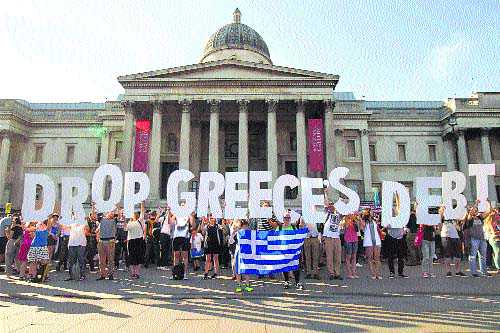
A second bailout to Greece when it did not honour the first made little sense.
S Nihal Singh
THE great concept of the European Economic Community, which morphed into the European Union (EU), is facing its greatest crisis as Greece totters under debt and is unable to meet its obligations. Whether it can remain in the eurozone, the common European currency shared by some EU members, should be decided in the coming days and weeks. But the crisis facing a unique undertaking in modern European history is larger than that of Greece.
Britain is in a peculiar position because the Conservative government of David Cameron has promised a referendum on whether to stay in the EU, before the end of 2017. But the rise of fringe parties on the continent, both on the right and the left, speak of the disillusionment of many on the goal of “an ever closer union”, three words Britain finds particularly bothersome.
Having joyously parted with a large portion of their sovereignty, European nations now find that they have given away too much. Syriza in Greece on the left, with extreme elements in it, was born out of this feeling, accentuated by a weak tax regime, a bloated public sector and a habit of living beyond its means. And Marine Le Pen’s extreme right National Front of France wants the old currency back, instead of the euro, and does not have much time for the EU.
Part of the problem facing Europe is economic. Decades of prosperity enjoyed by the EU nations ended up in recession and while a new generation of Europeans took it as given that it could live and work wherever it liked in any of the member states, the pain of recession hurt. Parties outside the mainstream, as in the case of Greece, suddenly bloomed. And in such member states as Hungary, the leadership is evolving its own brand of an authoritarian system, threatening to build barriers to keep out Serbs seeking EU goodies.
Nothing illustrates the narrowing of vision as EU members’reluctance to take an equitable share of waves of immigrants escaping from the mayhem and murder in Africa and the Middle East. Given their geographic location, Italy and Greece have had to bear most of the burden. While a face-saving solution was found in allocating 40,000 migrants among members, Britain, among others, refused to take any migrants.
Greece has forced Europeans to think through the difficulties they are facing, with the most important European leader, Angela Merkel, striking a cautious note. The EU is to blame in Greece’s case inasmuch as it gave it a second bailout when it did not honour the first, and in the failed last-minute negotiations, Alexis Tsipras asked for a third. Although Greeks were sick of years of austerity, they did not throw up a leader who could take the bull by the horns. It was therefore easy for the present Left regime to come to power, promising to stand up for the rights and dignity of the people.
While the Greek crisis will run its course after Sunday’s referendum on the terms of the deal offered by the EU, the group’s leaders must attend to the political problems underlining the heart of the crisis. The British problem must be dealt with separately because it has always been a reluctant European believing in its own exceptionalism and had received major opt-out concessions. Cameron is in a fix, having promised an in-out referendum because a British exit would greatly harm the country and the European enterprise.
Among member countries, Germany is most committed to the EU because its economic and political dominance is underpinned by the group. Given the World War II history, the EU serves as the sheet anchor overriding lingering concerns Europeans might harbour about the Nazi record. A breakup of Europe would therefore stir old demons. Today, Germany is a normal nation except for the bias it shows towards Israel against Palestinian rights to compensate for its past treatment of Jews.
However, the nub of the problem is to fire the imagination of a new generation on the great European enterprise. We are witnessing a return to a new parochialism and nationalism, with the left and the right exploiting this mood. There are, of course, limits to how far these extreme elements can go because we are living in a highly connected world and simply cannot go back to the nationalism of the 17th and 18th centuries.
Merkel cannot do the impossible because she has to heed her people who take a particularly dim view of the prospect of all the German money loaned to Greece going down the drain. In fact, the present crisis has somewhat dented her popularity as an astute leader. Perhaps it is time for her to give a new lead by soaring above the crisis to call Europeans to a new ideal. The point is that the EU has achieved much since its early days as the Coal and Steel Community than as the European Economic Community, and ultimately, the EU.
Over the decades, the European enterprise has made concessions to regionalism and nationalism by granting greater autonomy in financing and administration. Some incongruities remain such as the wasteful agricultural subsidies underpinned by French clout. But the EU remains a work in progress and ingenious ways can be found to surmount national hurdles. What is missing is the spark to ignite the passions of a new generation to a truly historic enterprise. Here is a true union of nation states choosing to give up chunks of their sovereignty for the common good.
It is easy enough to relight the fires of nationalism and selfishness for narrow gains but the leaders of Germany and France cannot let the European enterprise fail. Britain has still to decide which way to go.



























